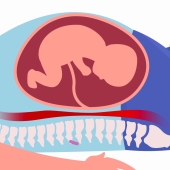If a baby passes meconium before birth, the amniotic fluid is stained and appears greenish in colour. The baby will also become covered in meconium, especially if there is a lot of vernix (waxy coating on skin). The baby may also swallow (not to be confused with aspirate) the meconium, which will not do any harm. Babies who pass meconium before birth can do so because their digestive system has matured.
They’re more likely to pass meconium before birth the longer they go past their due dates. It can also be caused by a sudden and short compression of the cord or head. The momentary lack of oxygen can cause the sphincter muscles to relax, allowing the meconium to be pushed out. Often the heads of babies are quite compressed in the final moments of birth and some are found to have a trail of meconium when their bodies are born. Meconium stained waters occurs in about 20% of full term births.
Is Meconium Dangerous?
If a woman’s waters break and meconium staining is noticed, it can cause a great deal of concern. If the colour of the water is greenish, usually this is an indication the meconium has only recently been passed. A brownish, yellow colour would indicate the meconium was passed some time earlier and is old. The main concern with meconium stained fluid is the possibility of the baby having meconium on the lungs. This is known as meconium aspiration syndrome (MAS).
Meconium Aspiration Syndrome
Meconium aspiration syndrome (MAS) is a condition that occurs when a newborn infant aspirates (or breathes in) a mixture of meconium and amniotic fluid (the fluid in which the baby floats inside the mother). Meconium is a newborn infant's first bowel movement, which is sticky, thick and dark green and is typically passed the first few days after birth. For reasons that are not always well understood, the baby will sometimes pass this first bowel movement while the infant is still in the womb. During the birth process the yet-to-be-born baby may breathe in or aspirate this meconium. This aspiration can happen hours before, during or immediately after delivery.
- 7530 views













